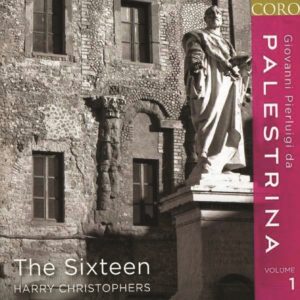Critic’s Pick: G.P. da Palestrina: Missa assumpta est Maria, Song of Songs, nos 9-11 (CORO)
Jonathan Slawson
Journalist
G.P. da Palestrina: Missa assumpta est Maria, Song of Songs, nos 9-11 (CORO)
Palestrina is considered by most to be the driving force in sacred music’s early development. His exploration of renaissance polyphony (at the time, uncharted territory), and his shear breadth of musical compositions make him one of the most influential composers in history. He wrote myriad masses and motets, most which were composed to serve the church. It should come as no surprise then, that Harry Christophers’, The Sixteen, chose Palestrina as their subject for a long-term music project; one that would allow them to showcase this great music in a series of volumes, each one centered around a particular theme. The selections here are framed around the Missa assumpta est Maria (Mass of Assumption), coupled with several ‘sensual and erotic’ numbers from the Song of Songs.
With so much music to choose from, it would be nearly impossible for The Sixteen to record an encyclopedia of all his work. In the accompanying disc notes, Christophers refers to Palestrina’s music as sounding “too perfect and occasionally academic”. His decision to frame their selections around a particular theme allows us to enjoy Palestrina’s music in a much different light, one that is decidedly centered on a common theme, breaking the traditional exploration of mere polyphony.
Palestrina’s music is driven primarily by the forward moving line, with a decided lack of cadential rigidity. Perhaps a modern listener might consider this sloppy, or not as clean as they are otherwise accustomed. Rather, The Sixteen brilliantly nuances the most important element of Palestrina’s polyphonic tunes – the flowing line. They have a bright, unified tone that entrances the listener almost immediately. Further, Christophers allows them to sing with a healthy, but not overbearing vibrato. It is pleasant, healthy singing, one that is enjoyable from start to finish.
The Sixteen, based in the United Kingdom, is rapidly gaining popularity as one of the premiere touring choirs in the world. Harry Christophers, their founder and conductor, shows particular admiration for English polyphony, Renaissance, Baroque, early-Classical, and Twentieth Century music.
If you are not familiar with this group, please visit their website to learn more: www.thesixteen.com
Listen music samples here: http://goo.gl/LVk7O
Do you have a CD that you would like reviewed in the journal?
Please contact me at jonathan.ryan.slawson@gmail.com

